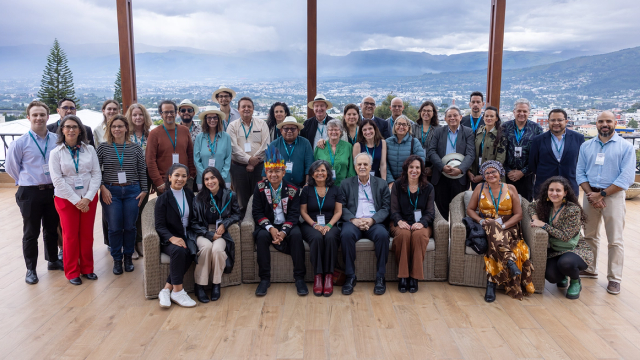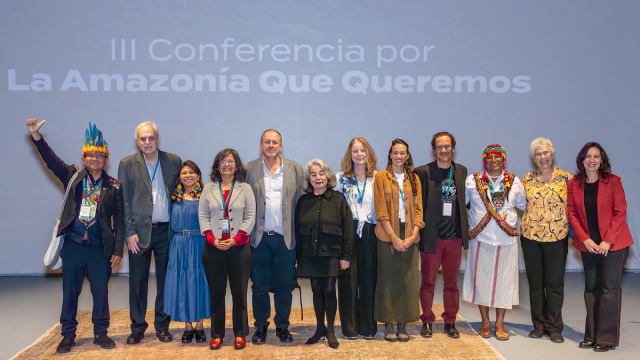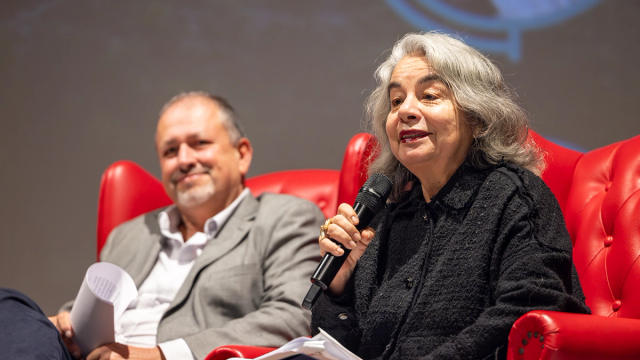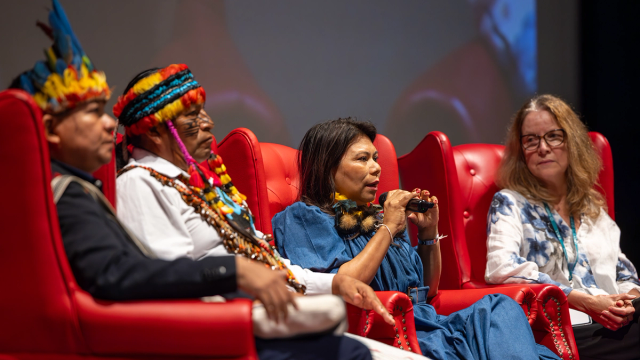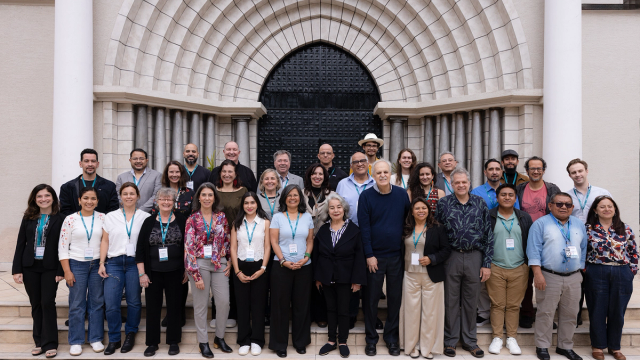Amazon Dialogues in the Heart of the Andes
From April 8–10, 2025, members of the UN Sustainable Development Solutions Network’s (SDSN) Science Panel for the Amazon (SPA) gathered in Quito, Ecuador, to advance work on their second Amazon Assessment Report (AR2025), set to launch this year at COP30 in Belém, Brazil. The AR2025 is centered on Amazonian connectivity and aims to deliver clear, actionable recommendations to decision-makers to drive conservation and sustainable development in the region.
Hosted by the Universidad San Francisco de Quito USFQ, the SPA workshop brought together over 40 participants, including members of the SPA’s Science Steering Committee (SSC), lead authors of the upcoming report, the Youth Advisory Committee (YAC), and the SPA Secretariat. This internal meeting was designed to review the first draft of AR2025 and to develop comprehensive key messages and recommendations. The first day laid the groundwork for the workshop, with collaborative review sessions of the report’s chapters.
On the morning of April 9, SPA and USFQ convened the III Conferencia por La Amazonía Que Queremos (Third Conference for The Amazon We Want) —a high-level public event following previous editions in Bogotá, Colombia (2024) and Belém, Brazil (2023). The conference brought together scientists, Indigenous leaders, and government officials to explore two key themes, regional connectivity in the Amazon and the role of Indigenous leadership in nature-based solutions, in the lead-up to COP30.
Keynote Speeches
Carlos Montúfar, President of USFQ’s Board of Trustees, welcomed over 350 attendees to USFQ’s Shakespeare Performance Hall. SPA Strategic Coordinator Emma Torres opened the event and introduced the first keynote speaker, Ecuador’s acting Minister of Environment, Water, and Ecological Transition, María Cristina Recalde. The Minister highlighted Ecuador’s biodiversity and spotlighted successful conservation and restoration initiatives.
Next, Roque Sevilla, President of Grupo FUTURO and former Mayor of Quito, called for a paradigm shift to conserve the Amazon. He criticized ineffective global summits and the financial sector’s contribution to deforestation, highlighting the underfunding of environment ministries and the lack of incentives to conserve forests. He proposed a national carbon monitoring system powered by Indigenous communities and technology, ensuring benefits reach forest stewards directly.
SPA Co-Chair Carlos Nobre took the stage to share the origin and mission of the Panel, which was established to address escalating deforestation, degradation, and fires in the Amazon. He stressed the global importance of the biome and the vital role of Indigenous and local knowledge. Warning of a nearing tipping point, he called for the realization of the Living Amazon Vision, rooted in conservation and restoration, a socio-bioeconomy, and inclusive governance. “Save the Amazon, save the Amazonian peoples—because this is the Amazon we want,” he concluded.
Andrea Encalada, USFQ Vice President and SPA SSC member, followed with a talk on the ecological and hydrological interdependencies of the Amazon. She highlighted the region’s crucial role in continental water cycles and noted that Quito sources 85% of its drinking water from the Amazon basin. She warned of threats such as dams, illegal mining, pollution, and climate change, urging investment in green infrastructure and the recognition of Indigenous and local knowledge to advance inclusive, sustainable conservation efforts.
Panel Discussions
The first panel discussion, moderated by Emma Torres, focused on regional Amazon connectivity and featured:
- Tarsicio Granizo, Executive Director of WWF Ecuador and former Minister of Environment of Ecuador;
- Mariana Gómez Soto, Coordinator of Alianza Noramazónica (ANA) at Fundación Gaia Amazonas and SPA Lead Author;
- Juan Manuel Guayasamín, USFQ Professor and SPA Lead Author;
- Yolanda Kakabadse, Chair of the Charles Darwin Foundation and former Minister of Environment of Ecuador.
Panelists emphasized that the Amazon is a deeply interconnected ecological, social, cultural, and political system, and warned of the accelerating loss of this connectivity. Granizo highlighted the Amazon Push strategy for collective regional recovery. Gómez Soto called for intercultural conservation approaches and strong territorial alliances. Guayasamín warned about the risk of reaching an ecological tipping point and the role of rivers and Indigenous Territories in conserving connectivity. Kakabadse urged scientists to communicate clearly to broad audiences and to connect environmental health with human well-being.
The second panel, moderated by Belén Páez, President of Fundación Pachamama and SPA Lead Author, explored Indigenous leadership for nature-based solutions. Panelists included:
- Carmen Josse, Executive Director of Fundación EcoCiencia and SPA Lead Author;
- Fany Kuiru Castro, General Coordinator of the Coordinator of Indigenous Organizations of the Amazon River Basin (COICA);
- Gregorio Mirabal, Climate & Biodiversity Coordinator at COICA and SPA Strategic Committee member;
- Uyunkar Domingo Peas Nampichkai, President of the Sacred Headwaters Alliance.
The panel delivered a unified message: Solutions for the Amazon must be rooted in Indigenous and local knowledge and governance. Josse noted that 57% of Amazon forests are in Indigenous Territories, where ecological connectivity is far better preserved. Kuiru Castro called for a holistic understanding of the territory, the promotion of knowledge dialogues, and the acknowledgement of women’s role in Amazon conservation. Mirabal stressed the need to implement Indigenous rights laws and proposed collective actions based on 5,000 years of oral tradition. Peas called for a reconnection with spirituality, stronger roles for women and youth, and greater investment in health and education. He closed with a powerful reminder: “Let’s all care for the Amazon—because the Amazon gives life to all humanity.”
Concluding Thoughts & Next Steps
To close the conference, SPA Co-Chair Marielos Peña-Claros shared an inspiring message, underscoring the urgency of restoring Amazonian connectivity, investing in education, and empowering youth to drive change. She called for sustained enthusiasm and collective action to conserve the Amazon.
As the audience exited the theater, they were invited to explore scientific poster presentations by Ecuadorian university researchers, as well as Amazonian cultural, artistic, and culinary exhibits. The event drew hundreds of attendees and reaffirmed the SPA’s role as a regional scientific voice and USFQ’s commitment to a sustainable future. The ideas shared during the conference will inform the final version of the AR2025, to be launched at COP30.
Throughout the afternoon of April 9 and into April 10, the SPA continued its working sessions. Exchanges on chapters concluded, and participants began discussing key messages and recommendations. They also discussed communication strategies for the report launch, the SPA’s engagement strategy with Indigenous Peoples and local communities, and the 2025 work plan. The Science Steering Committee held a strategic meeting to outline the Panel’s next steps. Additionally, SPA Lead Authors participated in a spokesperson training session to sharpen their communication skills for COP30 and beyond.
Finally, the gathering in Quito also marked the recording of the first two episodes of SPA’s new podcast, Conversations for the Amazon We Want, an initiative led by the SPA Youth Advisory Committee (YAC), to be launched later this year.
The Panel hopes its 2025 report will guide critical discussions at COP30 and shape a shared pan-Amazonian narrative at this historic moment. The SPA team returns home energized, clear in its next steps, and more committed than ever to building #TheAmazonWeWant.
